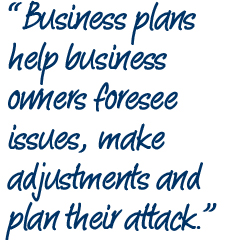Business Plans & Reviews
Is a business plan really necessary? If you want your business to have the best shot at succeeding, a well-crafted business plan is the way to go.
Business plans serve many purposes. Before starting a business, a simple business plan enables would-be entrepreneurs to flesh out their ideas and lay out their vision. When it comes to seeking funding or planning for expansion, a comprehensive business plan is almost always a must. And when it comes to problems down the road, business plans help business owners foresee issues, make adjustments and plan their attack.
"A business that operates without a business plan is a business that is on the road to financial failure," said Melanie O’Sullivan, founder and principle partner of JMOSC Investments & Consulting.
Of the several million startups that launch each year, the vast majority fail within the first few years, she said. "The primary reason for all of these failures is that they run out of money, the fundamental reason for their financial problems is lack of planning."
Some of these failures could have been prevented by having a business plan. Yearly business plans with cash-flow forecasts enable businesses to discover their impending cash shortages months, if not years, before they run short of money, O’Sullivan said.
To create a well-crafted business plan, your plan software cover the two critical parts of your business. The first part outlines the business's goals in the coming years and how they will be accomplished, O’Sullivan said. "Who is going to accomplish the goals? What are the milestones on the path to accomplishing the goals? And what people, tools and funds will be needed?"
The second part is a cash-flow forecast, which typically covers a three-year span – the first year includes monthly forecasts, and the second and third years have quarterly forecasts, O’Sullivan explained.
However, most entrepreneurs don't have an accounting background to help them make proper forecasts, he said. Business planning tools should fill that gap. Our company’s cash-flow forecast template forces entrepreneurs to carefully forecast all revenue and cost items; tells them how much money is needed and when it is needed; and warns them of financial problems before they occur. Similarly, your business-plan s you develop should delve deep into financial details, she said.
"The more specific a cash-flow forecast is, the better it is," O’Sullivan said. For instance, "listing a general overhead expense item is meaningless, while using rent, electric, etc. results in a meaningful forecast," she added.

